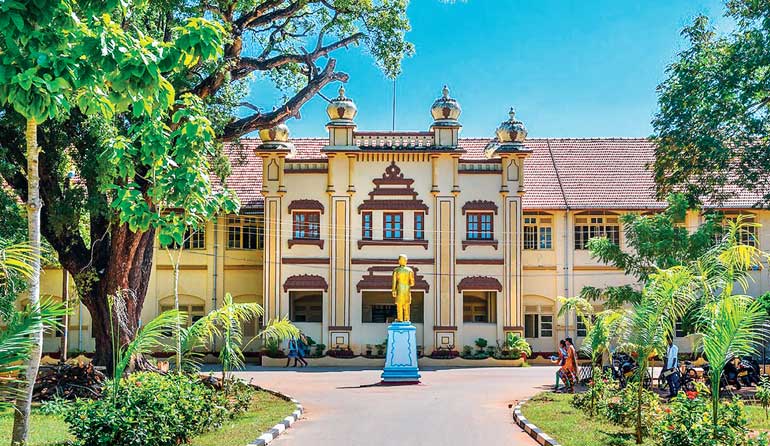Thursday Feb 19, 2026
Thursday Feb 19, 2026
Friday, 22 July 2016 00:00 - - {{hitsCtrl.values.hits}}

NOT BY MIGHT, NOR BY POWER – The spirit of a nascent Sri Lankan nationalism (inclusive, tolerant, Other-embracing) might be compromised if Government and civil society together don’t challenge competing nationalisms
Call me cynical, but I live by a maxim as far as news goes… “Don’t believe anything until it has been officially denied”. The Government’s spokespersons have officially denied that there is a racist or ethnic element to the recent incidents at the University of Jaffna. Shall we take the flat denial at face value? Or scratch beneath the surface so that the face of student unrest can express itself as the acne of a nation once riven, still struggling to reconcile itself to The Other?
 On the one hand, the State machinery and the State media have sought to plaster the cracks over the peeling, crumbling, façade of student activism in the northern seat of learning that’s the nation’s cynosure as the anniversary of 23 July draws near. One can understand, even readily empathise, with Government mandarins’ desire that the lid isn’t blown off the fumaroles of ethno-nationalist chauvinism again. Not now; not ever; never again. Especially now that precept, policy, practice (a holy trinity of good governance) is towing the national reconciliation line like never before perhaps. But one can no more shut down the explosively voluminous rumblings of a volcano by virtue of sitting on its spout with fear and trembling and fervent hope, than one can expedite ‘national reconciliation’ by dint of putting on multicultural pageants or instituting a ‘national reconciliation office’, or department or ministry.
On the one hand, the State machinery and the State media have sought to plaster the cracks over the peeling, crumbling, façade of student activism in the northern seat of learning that’s the nation’s cynosure as the anniversary of 23 July draws near. One can understand, even readily empathise, with Government mandarins’ desire that the lid isn’t blown off the fumaroles of ethno-nationalist chauvinism again. Not now; not ever; never again. Especially now that precept, policy, practice (a holy trinity of good governance) is towing the national reconciliation line like never before perhaps. But one can no more shut down the explosively voluminous rumblings of a volcano by virtue of sitting on its spout with fear and trembling and fervent hope, than one can expedite ‘national reconciliation’ by dint of putting on multicultural pageants or instituting a ‘national reconciliation office’, or department or ministry.
It’s definitely a necessary first step and certainly a much-needed, long-overdue, one; one that will take more than a programmatic approach to heal the wounds of pogroms, holocausts and apocalyptic counter-terrorism, or diabolical armageddons at the end of a brutal, bitter, protracted, conflagration. Worldviews cause wars – it’s only people who can make a holistic peace.
On the other hand, it’s people – a whole new younger generation of them – who won’t bury the hatchet except in The Other’s back. They don’t know anything much else about living in a multiethnic, multicultural, multilingual, society other than that plurality now, then, still, results in divisive nationalisms rather than a desirably integrated pluralism. And having lived through the deaths of a panoply of loved ones and the disappearances of a plethora of family, friends, and colleagues, they can’t begin to imagine that envisioning a new Sri Lanka – much less executing the nitty-gritty of national reconciliation’s nuts and bolts (smiles, handshakes, clasped arms, linked lives, facial expressions, body language, a myriad micro movements) – has to start with them…
These are the two views prevalent today: the dominant discourses of and on the same demographic and psychographic landscape. As seen from above (Government) as well as below (ground realities). From its Olympian heights – aloof, distant, imperious – Government may be keen to impose lawfulness, order, restraint, where anarchy seems likely to raise its ugly head again. The Promethean struggles on the Jaffna campus, however, subvert that agenda with ‘wars’ and ‘rumours of wars’.
We hear at first hand from students in the thick of things about “graveyard silences”, “police cordons”, “students taking refuge” in the spontaneous overflow of strong emotions; necessitated by pernicious “poster campaigns”, egregious “demolition of statues” in a milieu where certain religious icons are mushrooming in the environs of educational establishments, regrettable “destruction of stone benches” where lovers once sat but haters now roam…
Maybe, more importantly, despite “divisive agendas” and “distorted media coverage”, we hear of the “right to articulate culture-based identities”, in the midst of “scapegoating of students to feed the greed of sensationalism” and also “flames of narrow-minded politics” and alleged “fundamentalist political forces behind the violence” witnessed on the Jaffna campus.
It’s a volatile mix. A powder-keg far worse than Kosgama’s Salawa armoury’s explosion, just short of the flint of some perverted nationalism’s match-strike to explode. And from personal reflections filtering through to the national consciousness, it’s not merely a matrix of Tamil-Sinhala relations at Jaffna’s state university. There’s also the supposedly deteriorating relationship between Tamil and Muslim students (oil was reportedly thrown at the prayer room of Jaffna U’s Muslim students, which allegedly was not cleaned up).
In this inflammatory milieu, on the cusp of the anniversary of Sri Lanka’s ill-remembered national day of shame, guilt, and fear, who will pour oil on troubled waters? Or what steps can or must be taken – and by whom – to pre-empt and avert fresh horrors of an unfortunate series of events with the potential of an incipient holocaust?
There’s the bottom-up approach, working around and amidst the ground realities. It’s been essayed in numerous ways by idealists representing a new generation of citizens who seek a holistically integrated Sri Lanka. These range from naïve appeals to normalised responses (“violence is not the way” because social and political dynamics makes all players in conflict losers; “violence is not the answer” for anyone because we all need each other) to those which seek to neutralise student activism (“get your degrees, come join the system, and fix it from within”).
But these might come as too little, too late, for a lost generation looking into the abyss of ethno-nationalist tension once again – if the State fails to step in and countermand the shadowy workings of groups still suspected of seeking some nefarious profit or personal satisfaction from perpetuating conflict for their own entirely opaque and fathomable – also pitiable – ends… with motives to match. So from its ivory tower of official denials and wishful thinking that won’t make ground realities planted over decades vanish overnight, government has to get real; grab a spade and stop calling it ‘a gardening implement’; and uproot the rot at its root…
There are perhaps three broad spectra of action towards which Government (and with it, civil society including university students and campus administrators) could gravitate. If we all step up and step smart at this nascent stage of another neo-nationalism:
#1 Simplistic
The first course of action is a slight but significant expansion of the State machinery’s present tactics, which is to issue official denials. This is to deny the acute observation of sociologist-economist Thorstein Veblen that “born in iniquity and conceived in sin, the spirit of nationalism has never ceased to bend human institutions to the service of dissension and distress”. To take this route may be disingenuous but convenient, but if it is accompanied by an insistence that law and order take its due course there may be some slender advantage in that a volatile situation will be contained.
There is of course the volcano syndrome where the dissension and distress of competing nationalisms – on campus, or on the larger canvas of civil society – continues to simmer unacknowledged and officially denied … until it explodes (again). No one in their right mind desires such a consummation (except, perhaps, the deeply insecure and twisted psyches of those who pour petrol on the cinders of an incivil civil war just barely extinguished less than a decade ago). We hope the naysayers who claim that the clash on the northern campus was fractious factionalism and not a more egregious communalism are right. We would be relieved to be proven wrong in this respect, and we suspect right-minded members of Government would be relieved to find that their official denials have a basis in truth, and not simply expediency.
#2 Strategic
The second recourse is no less lawful, if less legalistic than the simple prosecution of offenders who fracture the peace. This is to recognise that competing nationalisms – far from being dead and buried in shallow post-war graves – still flourish and fight for a footing in our post-conflict society.
There are on the one hand even the moderate Tamil political parties whose agendas are transparent to everyone but themselves; reminding some of us about George Orwell’s chilling insight that “nationalism is power-hunger tempered by self-deception”. Such moderates as may be would do well to enter into a moratorium of self-examination and reflection on pursuing an agenda of national reconciliation through forgiveness and embracing the enemy, The Other, rather than agitating for an internationalist brand of transitional justice which prioritises facts over truths, hurts over healing. But if it is to be transitional justice rather than transformational mercy, so be it: for justice of any ilk is a pearl of greater price than peace without justice.
On the other hand, and far more tangibly dangerous, are the blatantly racist ideologues who strut about in their present avatar of Government ministers while nurturing ancient chauvinisms beneath a thin veneer of good governance. Provoked by any perceived threat to the supremacy of the ethnic identity they espouse, they bark. Placated by the powers that be – who probably see in their passion for the motherland a legacy in the making and a baton to be passed on – they simper and spout platitudes about ‘rights’ over ‘responsibilities’; reminding amused (or bemused) observers of writer-poet Richard Aldington’s pithy phrase: “nationalism is a silly cock crowing on his own dunghill”. Government, for its part, can contain and manage both of these types of competing nationalisms by a judicious deployment of debate, dialogue, and ratifying those promised but puzzlingly effete hate-speech laws…
#3 Subversive
Last but by no means least, the powers that be as much as the person in the street or at varsity could embrace an option that was not viable a decade or less ago, but is more and more the means to an end which makes the most sense in the present milieu of dissent and critical engagement. But rather than the spontaneous overflow of strong emotion or the sudden release of pent-up tensions as evinced in the campus clash, there has to be a systematic undertaking to explore the burning issue of national reconciliation in the context of ongoing competing nationalisms.
So “instead of reflecting on the kind of society we ought to create in order to accommodate individual or communal heterogeneity [we need to explore] what kind of selves we need to be (author’s emphasis) in order to live in harmony with others,” as war-traumatised academic Miroslav Volf once essayed. It is a subversive strategy that calls on all players – from the powerful democrats in government or power-hungry demagogues in cabinet, to the power-starved dissenters on campus and powerless activists on the ground – to challenge, critique, and change themselves; their worldviews; their praxis; their destiny.
Call me romantic. But it’s a motto that resonates with movements that matter. Be the change today you want to see in the world tomorrow.